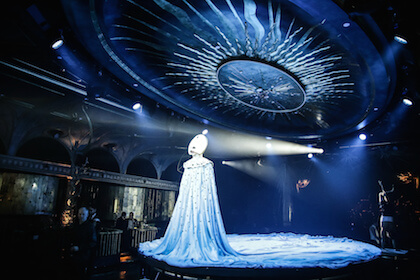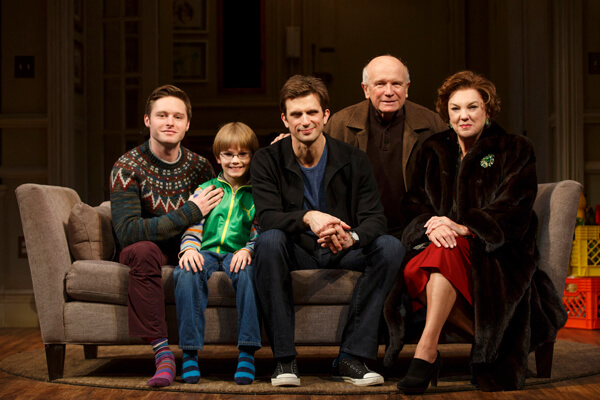Even in an inherently superficial role, Daniel Sunjata manages the best turn in Donald Margulies’ “The Country House.” | JOAN MARCUS
In “The Country House,” Donald Margulies is so busy knocking off Chekhov, Edna Ferber, and George S. Kaufman that he hasn’t bothered to write much of a play. With echoes of “The Seagull,” “Uncle Vanya,” and “The Royal Family,” this is a tale of actors offstage, but unlike those purloined and more entertaining plays, Margulies has created selfish people doing boring things. Newly minted though it may be, it seems dated and laborious.
Set in a country house outside Williamstown, Massachusetts, there is a faded stage star, a TV actor seeking to legitimize his lucrative, if superficial, celebrity in a “serious” play, a dyspeptic daughter, her recently widowed father with a new girlfriend, and a drunk uncle who wallows in his failure as an actor and playwright and his resentment over his mother’s success. Wind them all up, and then watch them unravel.
The inherent problem with Margulies’ writing is that there’s nothing seriously at stake for any of these characters. Vain attempts to relive one’s glory days or rage at a mother perceived as not being supportive enough are so hackneyed as plot points, it would take something truly remarkable to make them interesting in this day and age. Remarkable is decidedly missing from this country house, and if this play is intended as homage to better writers, Margulies has done them no honor.
“Curious Incident” a revelation, a backstage, comedy soars, while an offstage crowd bores
Blythe Danner as Anna, the aging star, brings nothing but mannerisms to the role. To be sure, that’s what has been written, but she goes from pose to set piece to pose with no apparent investment in what scant interior life the character might have. This is pretty much the case with the rest of the company. Trapped in undeveloped characters, there’s really nowhere for them to go.
Best of the lot is Daniel Sunjata, who is playing an inherently superficial character. Eric Lange as the resentful, alcoholic son has been given an almost impossible part to play believably, though he makes a valiant effort.
In “Rosencrantz and Guildenstern are Dead,” Tom Stoppard wrote, “We’re actors. We’re the opposite of people.” Prior to “The Country House,” I always thought that was ironic.
Rupert Grint, F. Murray Abraham, Stockard Channing, and Nathan Lane in Terrence McNally’s “It’s Only a Play.” | JOAN MARCUS
If you’d like to see how a real backstage comedy can be done, then nip down the street to the Schoenfeld, where Terrence McNally’s “It’s Only a Play” is getting a starry revival that succeeds on many levels. The play has been updated so that the names the stars drop incessantly are contemporary, but the story of a group of theater people hiding in a Manhattan townhouse’s master bedroom as they eagerly await opening night reviews remains unchanged.
Much of the humor of the play comes from the supposed glimpse of backstage nerves and egos as careers hang in the balance. And much of the charm of the current production comes from the stars. Nathan Lane as James Wicker, a TV star who pines to return to Broadway, is at the center of all the interconnecting stories. Lane is at the top of his comic form with an unerring ability to bring down the house with a well-timed explosion or the raising of an eyebrow.
Stockard Channing, as the aging film actress looking for artistic redemption on stage, balances hard-boiled with nearly crippling neurosis as well as elegance. Like Lane, she is a subtle comedian who knows how to land a gag.
Micah Stock plays a cater-waiter/ would-be actor hired for the evening who is both dim and ambitious. He holds his own brilliantly in the bevy of stars surrounding him. Rupert Grint is the enfant terrible who has directed the play in question, and what starts as a kind of generic character has some surprising and satisfying twists. F. Murray Abraham is the critic Ira Drew, also a would-be playwright and hanger-on.
Less successful is Megan Mullally as the first-time solo producer. Mullally can play the comedy, but she gets lost among the other characters. While that might be a directorial choice, she is often hard to hear, though she conveys an endearing innocence and enthusiasm for the theater.
Matthew Broderick as the playwright Peter Austin is, as usual, flat and uninteresting. He brings the same whiny cadences to his lines that he’s done in every production from “The Producers” onward. To be sure, part of what makes this play work is the opportunity for well-known actors to do their shtick, but Broderick’s wore out its welcome a long time ago. It is to McNally’s credit that Peter’s long speech in the second act is effective, but it would have been nice to see that done by an actor with more depth.
Jack O’Brien has directed this as a fast-paced romp bordering on farce, though instead of slamming doors we have percussive jokes. McNally’s sly but loving observation of the world of the theater delivers contemporary laughs from a classic storyline. Indeed, after hanging out with these characters in town, who would ever want to go to the country?
Alex Sharp in “The Curious Incident of the Dog in the Night-Time.” | JOAN MARCUS
In adapting “The Curious Incident of the Dog in the Night-Time,” Simon Stephens had a serious challenge: how to create empathy for an autistic character who is unable to express emotion. The success is surprising and unexpectedly moving, aided by the electronically driven set from Bunny Christie, which brilliantly evokes what happens in the mind of Christopher, the main character, as he encounters and is overwhelmed by the world.
Like many autistic young people, Christopher appears slow because of his literalism and inability to emote, but he is a math genius. The first act is about Christopher trying to discover who has killed a neighbor’s dog — for which he is initially blamed — and his interactions with people who don’t understand him. The second act shifts gears and is largely about Christopher trying to negotiate the larger world and find his way to his mother in London.
In essence, the play moves from a small story to a kind of epic. The rapidly changing set focuses excitement on Christopher, and it’s best to just go with that ride and the theatricality of the storytelling. And here’s where the empathy happens: one is suddenly cognizant of the overwhelming nature of the world that most of us simply ignore or filter out. Drilled down to a granular level, where even getting on a subway car can be daunting, we begin to gain a deeper understanding of what we miss in our rush and drama. Christopher forces us to stop and think about the world and how we encounter it.
Director Marianne Elliott has embraced the dichotomy between the character’s limitations and the overwhelming nature of the world, and her somewhat expressionistic staging is still clearly narrative. With the exception of Alex Sharp, who makes a stunning Broadway debut as Christopher, the cast is an ensemble taking many roles and fluidly filling out his world. This is one of those rare pieces that stays with you and might even make you challenge how you — as someone who counts yourself as “normal” — encounter the world.
THE COUNTRY HOUSE | Samuel J. Friedman Theatre, 261 W. 47th St. | Tue.-Wed. at 7 p.m.; Thu.-Sat. at 8 p.m.; Wed., Sat.-Sun. at 2 p.m. | $67-$125 at telecharge.com or 212-239-6200 | Two hrs., 30 mins., with intermission
IT’S ONLY A PLAY | Gerald Schoenfeld Theatre, 236 W. 45th St. | Tue., Thu. at 7 p.m.; Wed., Fri.-Sat. at 8 p.m.; Wed., Sat. at 2 p.m.; Sun. at 3 p.m. | $87-$172 at telecharge.com or 212-239-6200 | Two hrs., 40 mins., with intermission
THE CURIOUS INCIDENT OF THE DOG IN THE NIGHT-TIME | Ethel Barrymore Theatre, 243 W. 47th St. | Tue., Thu. at 7 p.m.; Wed., Fri.-Sat. at 8 p.m.; Wed., Sat. at 2 p.m.; Sun. at 3 p.m. | $27-$150 at telecharge.com or 212-239-6200 | Two hrs., 40 mins., with intermission






































